Chinese Poetry 中国诗歌介绍 英文版.ppt
- 格式:ppt
- 大小:2.74 MB
- 文档页数:32
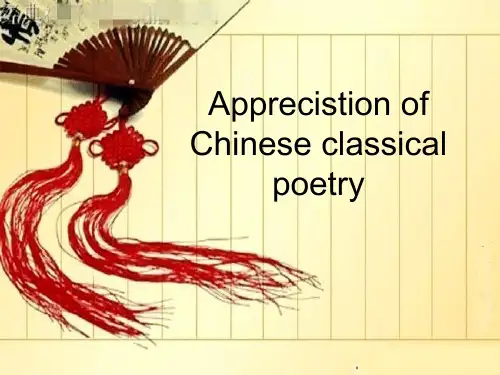
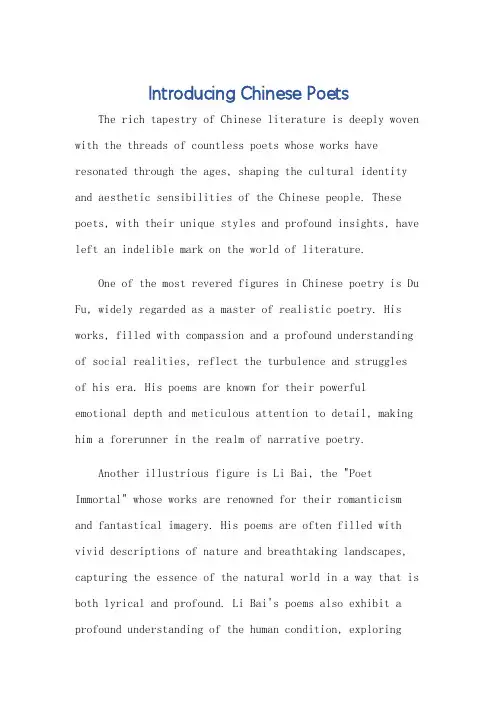
Introducing Chinese PoetsThe rich tapestry of Chinese literature is deeply woven with the threads of countless poets whose works have resonated through the ages, shaping the cultural identity and aesthetic sensibilities of the Chinese people. These poets, with their unique styles and profound insights, have left an indelible mark on the world of literature.One of the most revered figures in Chinese poetry is Du Fu, widely regarded as a master of realistic poetry. His works, filled with compassion and a profound understanding of social realities, reflect the turbulence and struggles of his era. His poems are known for their powerful emotional depth and meticulous attention to detail, making him a forerunner in the realm of narrative poetry.Another illustrious figure is Li Bai, the "Poet Immortal" whose works are renowned for their romanticism and fantastical imagery. His poems are often filled with vivid descriptions of nature and breathtaking landscapes, capturing the essence of the natural world in a way that is both lyrical and profound. Li Bai's poems also exhibit a profound understanding of the human condition, exploringthemes of loneliness, longing, and the fleeting nature of existence.Wang Wei, a master of landscape poetry, is another notable figure. His poems, often centered around the beauty of nature, are known for their serene and meditative tone. Wang Wei's works are filled with a profound sense of tranquility and harmony, reflecting his deep connection with the natural world and his belief in the therapeutic power of nature.The legacy of these poets continues to inspire and influence generations of writers and thinkers. Their works, translated into various languages, have introduced the beauty and depth of Chinese poetry to the world. The themes and techniques employed by these poets have also been widely emulated and adapted by poets from other cultures, furthering the global exchange and understanding of poetry. In conclusion, the Chinese poets, with their unique styles and profound insights, have made indelible contributions to the world of literature. Their works,filled with emotional depth, narrative power, and aesthetic beauty, continue to resonate with readers across the globe,serving as a bridge between cultures and a testament to the enduring power of poetry.**介绍中国诗人**中国文学的丰富织锦深深地融入了无数诗人的笔触之中,他们的作品历经岁月洗礼,仍然回响不绝,塑造了中国人民的文化身份和审美情感。

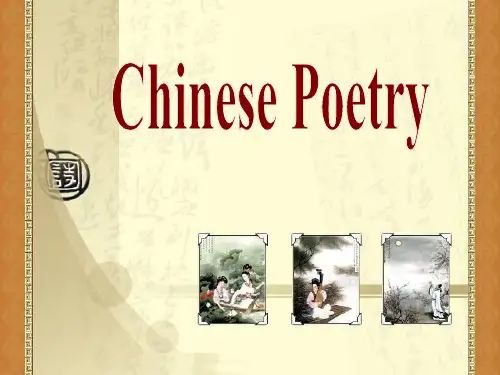
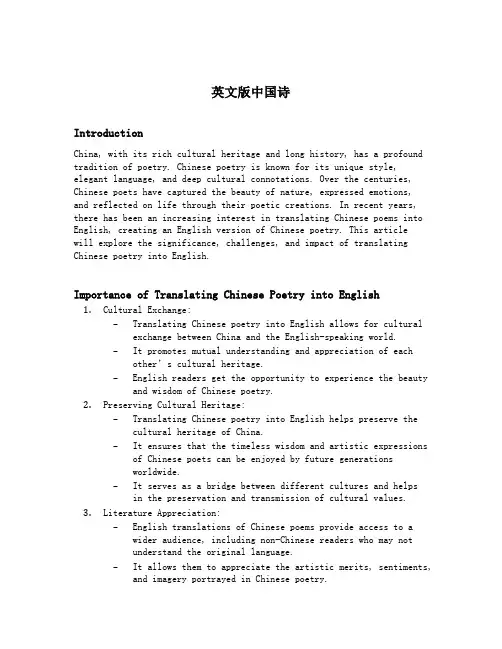
英文版中国诗IntroductionChina, with its rich cultural heritage and long history, has a profound tradition of poetry. Chinese poetry is known for its unique style, elegant language, and deep cultural connotations. Over the centuries, Chinese poets have captured the beauty of nature, expressed emotions,and reflected on life through their poetic creations. In recent years, there has been an increasing interest in translating Chinese poems into English, creating an English version of Chinese poetry. This articlewill explore the significance, challenges, and impact of translating Chinese poetry into English.Importance of Translating Chinese Poetry into English1.Cultural Exchange:–Translating Chinese poetry into English allows for cultural exchange between China and the English-speaking world.–It promotes mutual understanding and appreciation of each other’s cultural heritage.–English readers get the opportunity to experience the beauty and wisdom of Chinese poetry.2.Preserving Cultural Heritage:–Translating Chinese poetry into English helps preserve the cultural heritage of China.–It ensures that the timeless wisdom and artistic expressions of Chinese poets can be enjoyed by future generationsworldwide.–It serves as a bridge between different cultures and helps in the preservation and transmission of cultural values.3.Literature Appreciation:–English translations of Chinese poems provide access to a wider audience, including non-Chinese readers who may notunderstand the original language.–It allows them to appreciate the artistic merits, sentiments, and imagery portrayed in Chinese poetry.–It enables cross-cultural literary appreciation and fostersa global understanding of poetic traditions.Challenges in Translating Chinese Poetry into English1.Cultural Differences:–Chinese poetry is deeply rooted in Chinese culture, history, and philosophy, making it challenging to convey the samenuances and references in English.–Some poetic devices and wordplay may be lost or difficult to reproduce in translation.–Translators need to strike a balance between staying loyal to the original meaning and making the poem accessible toEnglish readers.2.Linguistic Differences:–Chinese and English have vastly different linguisticfeatures, such as grammar, syntax, and vocabulary.–It is often difficult to capture the exact rhythm, melody, and tonal qualities of Chinese poetry in English translation.–Translators face the challenge of finding equivalentexpressions or poetic devices in English to recreate theessence of the original poem.3.Translating Cultural Concepts:–Chinese poetry often incorporates cultural concepts, myths, and historical events that may be unfamiliar to Englishreaders.–Translators must navigate these cultural gaps and find appropriate explanations or contextual information toenhance understanding without disrupting the flow of thepoem.4.Interpretation and Subjectivity:–Translating poetry involves interpretation and subjective choices by the translator.–Different translators may have different interpretations, leading to variations in the translated versions.–Translators must be mindful of their own biases and strive to capture the essence and intent of the original poem asaccurately as possible.Impact of English Versions of Chinese Poetry1.Global Recognition:–English versions of Chinese poetry have gained international acclaim, introducing the richness and beauty of Chineseculture to a global audience.–It has led to a greater appreciation and recognition of Chinese literary traditions in the English-speaking world. 2.Cross-Cultural Dialogue:–English translations of Chinese poetry encourage cross-cultural dialogue and understanding between China and theWest.–It facilitates conversations on shared values, universal human experiences, and the similarities and differencesbetween poetic traditions.3.Inspiring Western Poets:–English versions of Chinese poems have influenced Western poets, serving as a source of inspiration for their ownpoetic creations.–It has led to the emergence of new poetic forms and styles that blend elements of Chinese and Western traditions.cational Value:–English versions of Chinese poetry provide valuableeducational resources for students and scholars studyingChinese or comparative literature.–It offers insights into the historical and cultural contexts of China, fostering a deeper understanding of Chinesesociety and its artistic achievements.ConclusionTranslating Chinese poetry into English plays a crucial role in promoting cultural exchange, preserving cultural heritage, and fostering global understanding. While facing challenges due to cultural and linguistic differences, the impact of English versions of Chinese poems is significant in terms of global recognition, cross-cultural dialogue, inspiration for Western poets, and educational value. Through theefforts of translators, Chinese poetry can continue to enchant a wider audience, transcending language barriers and enriching the world of literature.。
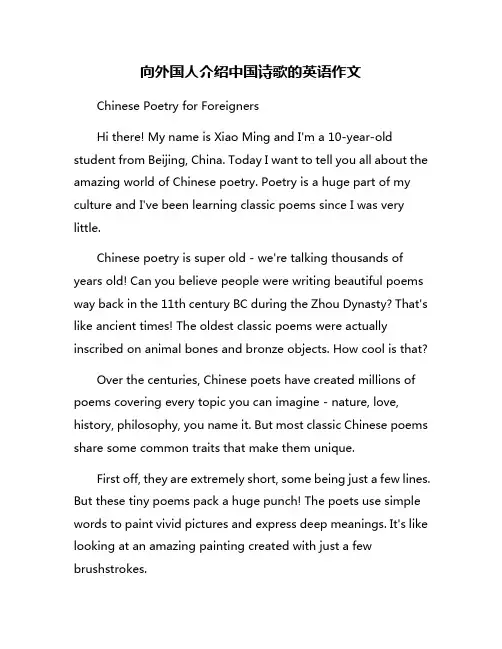
向外国人介绍中国诗歌的英语作文Chinese Poetry for ForeignersHi there! My name is Xiao Ming and I'm a 10-year-old student from Beijing, China. Today I want to tell you all about the amazing world of Chinese poetry. Poetry is a huge part of my culture and I've been learning classic poems since I was very little.Chinese poetry is super old - we're talking thousands of years old! Can you believe people were writing beautiful poems way back in the 11th century BC during the Zhou Dynasty? That's like ancient times! The oldest classic poems were actually inscribed on animal bones and bronze objects. How cool is that?Over the centuries, Chinese poets have created millions of poems covering every topic you can imagine - nature, love, history, philosophy, you name it. But most classic Chinese poems share some common traits that make them unique.First off, they are extremely short, some being just a few lines. But these tiny poems pack a huge punch! The poets use simple words to paint vivid pictures and express deep meanings. It's like looking at an amazing painting created with just a few brushstrokes.Another cool thing is that many poems have a strict pattern of characters and syllables per line, as well as rhythm and tonal patterns. This makes them fun to read out loud, almost like singing. I love reciting my favorite classic poems - it's like a little workout for my brain and mouth!The poems also make heavy use of metaphors, comparing one thing to another in creative ways. Like this line from a famous Tang Dynasty poem: "A lovely person attracts hundreds of flowers." Get it? The "lovely person" isn't really attracting flowers, it means they are super charming and popular. Fun word pictures like that are everywhere in Chinese poems.I should mention that Chinese poetry is closely tied to calligraphy, the art of beautiful handwriting. Many poems were originally written as calligraphy pieces, with the characters drawn in an artistic way that adds even more meaning. Appreciating the poetry often means appreciating the calligraphy too. It's a very visual art form.Now let me teach you about some of the most common forms of classic Chinese poetry:Shi PoetryThese are poems with strict rules for rhythm, tones, line lengths, and rhyming patterns. The most famous type is call lǚ shī with 8 lin es of 5 or 7 characters each in a set pattern. Writing poems that followed all the rules was considered a major skill for scholars.Ci PoetryWhile shi poems follow rigid patterns, ci poems are more free and lyrical, with lines of irregular lengths and relaxed rhythms. They were often set to music as lyric songs. Many ci poems talk about love, heartbreak, and longing.Qu PoetryThese are shorter lyrics poems that follow strict patterns of line lengths, tones, and rhymes. They were written for songs and have a very melodic, sing-song quality when recited out loud.Folk SongsSimple poems written by everyday people, usually following loose patterns and using lots of repetition and metaphors. These captured the joys and struggles of common village life.My personal favorites are the shi and folk song styles. The shi poems are awesome brain teasers with all their tonal patterns and rhymes. But I also love the fun, down-to-earth imagery offolk songs that use so many wise sayings and catchy word pictures.Here's part of a famous folk song that uses metaphors to compare two soul mates to natural things:Green trees woven as one,Water gushing forth as a whole...Person person united as one,Joined by red cords.See how it paints a beautiful picture of two souls intertwined like trees and flowing water? Isn't that romantic and clever?Well, I could honestly go on all day about Chinese poetry. It has had such a huge influence on my country's culture, values, and way of looking at the world. Even modern songs and stories still make references to ancient poems.I feel so lucky to be steeped in this poetic tradition from sucha young age. Memorizing and understanding classic poems makes me appreciate the wisdom, beauty, and craft of ages past. It connects me to my ancestors in a very powerful way. I may be just a kid, but I feel part of an amazing literary legacy that goes back thousands of years.If you ever get a chance, I highly recommend checking out some translations of Chinese poems. You'll be blown away by how such simple words can express such profound ideas and images. And poetry is a window into the Chinese mind, heart, and soul. I promise you won't regret taking a peek through that window.That's all from me - thanks for listening! I'm off to memorize a few more poems now. Maybe I'll be a famous poet myself someday. A boy can dream, right? Until next time...study hard, work hard, and live poetically!。
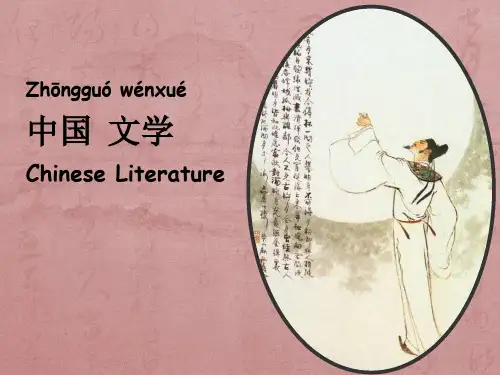
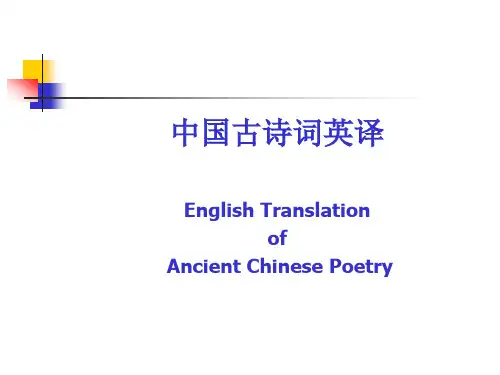
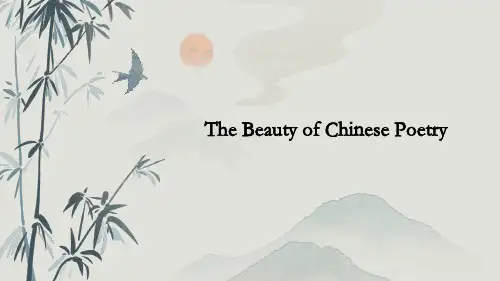
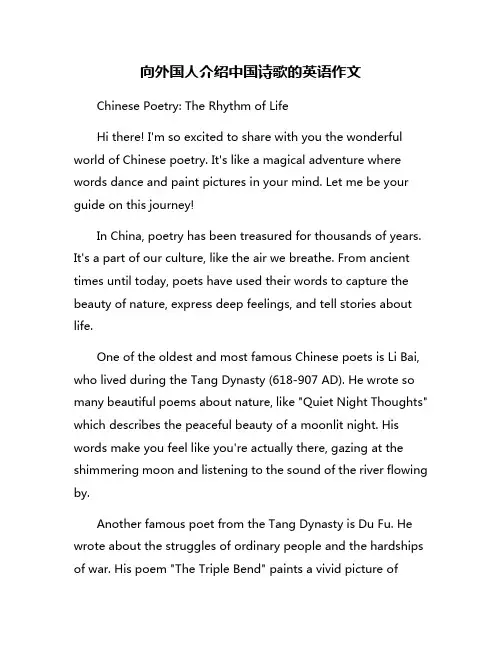
向外国人介绍中国诗歌的英语作文Chinese Poetry: The Rhythm of LifeHi there! I'm so excited to share with you the wonderful world of Chinese poetry. It's like a magical adventure where words dance and paint pictures in your mind. Let me be your guide on this journey!In China, poetry has been treasured for thousands of years. It's a part of our culture, like the air we breathe. From ancient times until today, poets have used their words to capture the beauty of nature, express deep feelings, and tell stories about life.One of the oldest and most famous Chinese poets is Li Bai, who lived during the Tang Dynasty (618-907 AD). He wrote so many beautiful poems about nature, like "Quiet Night Thoughts" which describes the peaceful beauty of a moonlit night. His words make you feel like you're actually there, gazing at the shimmering moon and listening to the sound of the river flowing by.Another famous poet from the Tang Dynasty is Du Fu. He wrote about the struggles of ordinary people and the hardships of war. His poem "The Triple Bend" paints a vivid picture ofsoldiers marching through treacherous mountain paths. You can almost hear the sound of their boots and feel the weight of their armor.During the Song Dynasty (960-1279 AD), a poet named Su Shi became famous for his work. He wrote about everyday life, like drinking tea or admiring the blooming of flowers. His poems are like little snapshots of the simple joys in life, reminding us to slow down and appreciate the beauty around us.One thing that makes Chinese poetry so special is the use of imagery and symbolism. Poets often compare things in nature to human emotions or experiences. For example, a willow tree might represent a person's grace and elegance, while a mountain could symbolize strength and resilience.Another unique feature of Chinese poetry is the use of tones. The Chinese language has four different tones (flat, rising, falling, and falling-rising), and poets carefully choose words with specific tones to create a beautiful rhythm and melody when the poem is read aloud.Chinese poems also have strict rules about the number of characters or syllables in each line. This might sound a bit confusing, but it's like a fun puzzle for the poet to solve! Theyhave to carefully choose their words to fit the pattern and create a harmonious flow.One of my favorite Chinese poems is called "The Quiet Night" by Li Qingzhao, a famous female poet from the Song Dynasty. It's a short poem, but it paints such a vivid picture of a peaceful night, with the moonlight shining on the floor and the sound of a distant flute drifting through the air. It's like a little moment of tranquility captured in words.Chinese poetry is not just about pretty words and fancy imagery – it's a way of expressing deep emotions and capturing the essence of life. Whether it's the joy of springtime or the sorrow of a broken heart, poets have a way of putting those feelings into words that resonate with all of us.So, the next time you're feeling happy, sad, or just want to appreciate the beauty around you, why not try reading some Chinese poetry? Let the words wash over you like a gentle stream, and see where your imagination takes you. Who knows, maybe you'll even be inspired to write your own poems one day!I hope you've enjoyed this little introduction to the wonderful world of Chinese poetry. It's a vast and beautiful ocean, and I've only shown you a tiny drop. But I hope it'ssparked your curiosity and given you a glimpse into the rich poetic traditions of my homeland.Happy exploring, my friends! And remember, the rhythm of life is all around us, just waiting to be captured in words.。
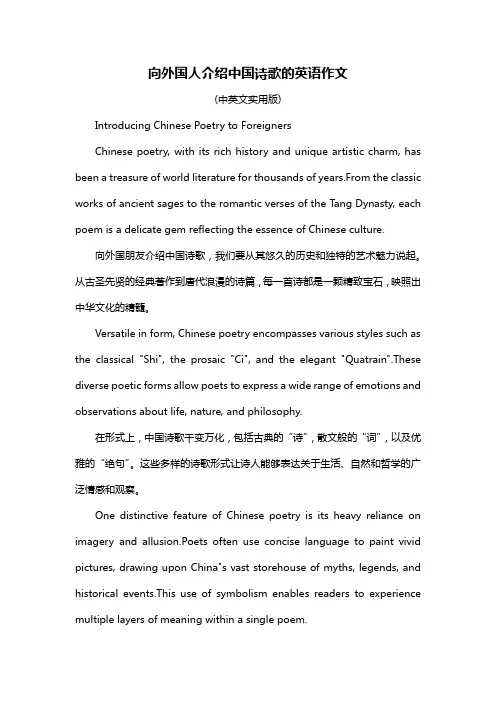
向外国人介绍中国诗歌的英语作文(中英文实用版)Introducing Chinese Poetry to ForeignersChinese poetry, with its rich history and unique artistic charm, has been a treasure of world literature for thousands of years.From the classic works of ancient sages to the romantic verses of the Tang Dynasty, each poem is a delicate gem reflecting the essence of Chinese culture.向外国朋友介绍中国诗歌,我们要从其悠久的历史和独特的艺术魅力说起。
从古圣先贤的经典著作到唐代浪漫的诗篇,每一首诗都是一颗精致宝石,映照出中华文化的精髓。
Versatile in form, Chinese poetry encompasses various styles such as the classical "Shi", the prosaic "Ci", and the elegant "Quatrain".These diverse poetic forms allow poets to express a wide range of emotions and observations about life, nature, and philosophy.在形式上,中国诗歌千变万化,包括古典的“诗”,散文般的“词”,以及优雅的“绝句”。
这些多样的诗歌形式让诗人能够表达关于生活、自然和哲学的广泛情感和观察。
One distinctive feature of Chinese poetry is its heavy reliance on imagery and allusion.Poets often use concise language to paint vivid pictures, drawing upon China"s vast storehouse of myths, legends, and historical events.This use of symbolism enables readers to experience multiple layers of meaning within a single poem.中国诗歌的一大特色是它对意象和典故的依赖。
中国诗歌英文作文英文:Chinese poetry is a beautiful and profound art formthat has been cherished for centuries. It is a reflection of the Chinese culture, history, and philosophy, and it often captures the emotions and thoughts of the poets in a concise and elegant manner.One of the most famous Chinese poets is Li Bai, also known as Li Po, who lived during the Tang Dynasty. His poetry is characterized by its romanticism, nature imagery, and emotional depth. For example, in his poem "Quiet Night Thoughts," he expresses his feelings of loneliness and longing for his homeland:床前明月光,疑是地上霜。
举头望明月,低头思故乡。
This simple yet powerful poem conveys a sense of nostalgia and homesickness that resonates with many people. It shows how Chinese poetry can evoke universal emotions and experiences.Another renowned poet is Du Fu, also from the Tang Dynasty, known for his realism and social commentary in his poetry. In his poem "Spring View," he vividly describes the beauty of nature and the plight of the common people:国破山河在,城春草木深。
唐诗英文介绍The Tang Dynasty (618-907 CE) is widely regarded as the golden age of Chinese poetry, producing some of the most renowned and influential poets in the history of Chinese literature. During this period, poetry flourished and reached unprecedented heights, with a diverse range of styles, themes, and forms that have continued to captivate readers and scholars alike. The Tang poets' mastery of language, their keen observations of the natural world, and their profound reflections on the human experience have made their works timeless classics that continue to resonate with people across cultures and generations.One of the most distinctive features of Tang poetry is its emphasis on vivid imagery and sensory details. The poets of this era were skilled at capturing the beauty and essence of the natural world, from the gentle rustling of leaves to the majestic grandeur of mountains and rivers. Through their poetic descriptions, they transported readers to these scenic landscapes, allowing them to experience the sights, sounds, and even the scents of the environment. This attention to detail and sensory experience was notmerely a stylistic choice, but a reflection of the Tang poets' deep appreciation and reverence for the natural world.Another hallmark of Tang poetry is its exploration of the human condition and the complexities of the human experience. The poets of this era grappled with themes of love, loss, longing, and the search for meaning in life. They delved into the depths of human emotions, capturing the joys and sorrows, the triumphs and defeats that are a fundamental part of the human experience. Through their poetic expressions, they gave voice to the universal experiences that connect us all, transcending the boundaries of time and culture.One of the most renowned Tang poets is Li Bai, also known as Li Po or Li Bo. His poetry is characterized by its lyrical beauty, its profound philosophical insights, and its celebration of the free-spirited, wandering life. Li Bai's poems often depict the poet's solitary journeys through the natural world, where he finds solace and inspiration in the beauty of the landscape and the serenity of the moment. His most famous works, such as "Drinking Alone by Moonlight" and "Changgan," have become beloved classics that continue to be widely read and studied today.Another iconic figure of Tang poetry is Du Fu, often referred to as the "Poet Sage." Du Fu's poetry is renowned for its depth of emotion, its social commentary, and its keen observations of the humancondition. Unlike the more carefree and romantic Li Bai, Du Fu's poems reflect the turbulent times in which he lived, marked by political upheaval, social unrest, and personal hardship. His works, such as "Ballad of the Army Carts" and "Autumn Meditations," offer a poignant and insightful perspective on the human experience, touching on themes of loss, displacement, and the search for meaning in the face of adversity.In addition to these renowned poets, the Tang Dynasty also produced a wealth of other influential and innovative writers, each with their own distinct style and thematic focus. From the contemplative and philosophical poems of Wang Wei to the vivid and evocative works of Bai Juyi, the Tang era witnessed a remarkable diversity of poetic expression that has continued to captivate and inspire readers throughout the centuries.One of the unique aspects of Tang poetry is its rich and diverse poetic forms. While the classic Chinese poetic forms, such as the shi and the ci, were well-established by this time, the Tang poets also experimented with new and innovative structures, pushing the boundaries of the art form. The lushi, or regulated verse, with its strict rhyme schemes and metrical patterns, became a hallmark of Tang poetry, showcasing the poets' mastery of language and their ability to create intricate and harmonious compositions.The influence of Tang poetry extends far beyond the borders of China, as it has been widely translated and studied around the world. The universal themes and the timeless beauty of these works have captivated audiences across cultures, inspiring poets, artists, and scholars to explore and engage with this rich literary tradition. The legacy of Tang poetry continues to shape and inspire the literary landscape, with its enduring impact on the development of poetry and the human understanding of the world and our place within it.In conclusion, the Tang Dynasty stands as a pivotal era in the history of Chinese literature, and its poetry has left an indelible mark on the cultural and artistic landscape. The Tang poets' mastery of language, their keen observations of the natural world, and their profound reflections on the human experience have made their works timeless classics that continue to be studied, celebrated, and cherished by people around the world. The enduring legacy of Tang poetry serves as a testament to the power of the written word to capture the beauty, the complexity, and the essence of the human experience.。
介绍中国诗歌英文作文英文:Chinese poetry is a form of literature that has a long and rich history. It dates back to the Shijing, or Book of Songs, which was compiled in the 6th century BC. Since then, Chinese poetry has evolved and developed into manydifferent forms, including shi (regulated verse), ci (lyric poetry), and qu (dramatic poetry).One of the most distinctive features of Chinese poetryis its use of tonal patterns. In shi, for example, eachline consists of five or seven characters, and each character has a specific tone. These tonal patterns createa musical quality that is unique to Chinese poetry.Another important aspect of Chinese poetry is its useof imagery. Poets often use vivid and powerful images to convey their emotions and ideas. For example, in Li Bai's famous poem "Drinking Alone by Moonlight," he describeshimself as a "happy bird" who is free to roam and sing ashe pleases.Chinese poetry has also been influenced by various philosophical and religious traditions, such as Confucianism, Taoism, and Buddhism. Many poems express the poet's search for meaning and enlightenment, as well astheir connection to the natural world.Overall, Chinese poetry is a rich and diverse art form that has had a profound impact on literature and culture around the world.中文:中国诗歌是一种历史悠久、文化底蕴深厚的文学形式。
中国诗歌英语作文Chinese poetry, an ancient and profound art form, has captivated hearts and minds for centuries. Its beauty lies not only in the intricate rhymes and melodies but also in the deep philosophical and emotional insights it offers.From the concise yet profound quatrains of Tang poetry to the narrative richness of Song lyrics, Chinese poetry exhibits a vast range of expression. These poems often paint vivid pictures of nature, describing mountains, rivers, flowers, and the changing seasons with such precision and elegance that the reader feels transported to those scenes.Moreover, Chinese poetry is a powerful tool for expressing human emotions. Whether it's the joy of reunion, the sorrow of separation, or the reflection on life's transience, poets have found a way to convey these feelings with remarkable subtlety and depth. The use of imagery and symbolism adds another layer of meaning, allowing the reader to interpret the poems in their own way.Furthermore, Chinese poetry is often a reflection of the society and culture of its time. It provides insights into the values, beliefs, and way of life of ancient Chinese people. Bystudying these poems, we can gain a deeper understanding of Chinese history and culture.In conclusion, Chinese poetry is a timeless art form that continues to inspire and amaze even in the modern era. Its beauty and wisdom transcend cultural boundaries, making it a universal language of the human soul. Whether you're a literature lover or simply someone who appreciates the art of expression, Chinese poetry is worth exploring and cherishing.。